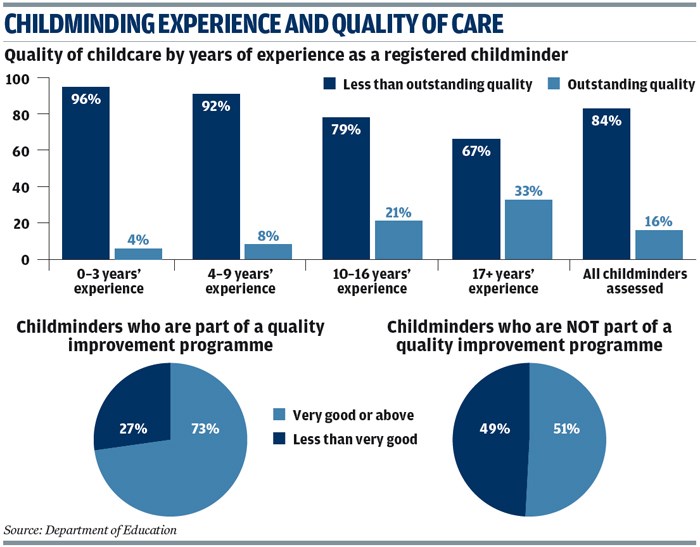Research Report: Study of the Quality of Childminder Provision in England
Charlotte Goddard
Tuesday, October 27, 2015
This study set out to examine the key characteristics of childminding provision, including factors that characterise high-quality childcare.
Authors: Maria Pia Otero, 4Children and Edward Melhuish, University of Oxford
Published by: Department for Education, September 2015
Summary
Childminders play a major role in childcare provision for two-year-olds but little in-depth research has been carried out in this area. This study – Study of Early Education and Development (SEED): Study of the Quality of Childminder Provision in England – looked at a sample of 99 childminders from across five regions in England and gathered data through observation of practice and interviews using a set of structured questions.
Almost all childminders in the study had other jobs before becoming childminders, with a third previously working in childcare-related employment. The most common relevant qualification held was a Level 3 diploma with most childminders – 92 per cent – in the sample having a Level 3 or higher qualification. Almost half worked with at least one assistant or co-childminder. Half of the assistants or co-childminders had a Level 3 qualification relevant to working with children and a quarter had no formal education related to working with children.
Three quarters of childminders were registered with the local authority to deliver funded places for disadvantaged two-year-olds. Almost half were providing one or more funded early education places for three and four-year-olds. One fifth of childminders in the sample cared for a child with special educational needs or disabilities and almost all said they were open to doing so. Nine out of 10 childminders attended continuous professional development training at least twice a year in addition to mandatory safeguarding and first aid training. Half of childminders had received support from their local authority during the last year.
The researchers used two scales - the Sustained Shared Thinking and Emotional Wellbeing (SSTEW) scale and the Family Environmental Rating Scale-Revised (FCCERS-R) - to measure the quality of childcare delivered by the childminders. The average score on both scales was "good", with 11 per cent of settings judged as "outstanding" on the FCCERS-R quality measure and 16 per cent on the SSTEW quality scale. Very few had an "inadequate" or minimal overall quality score at one per cent and seven per cent respectively on the FCCERS-R scale and three per cent and 11 per cent respectively on the SSTEW scale.
The study found three main drivers of high-quality childcare in childminders - a lower adult-to-child ratio; high levels of early years training and support through a quality improvement programme or a quality assurance scheme; and the years of experience as a childminder (see graphic).

Implications for practice
Participation in a quality improvement programme or a quality assurance scheme has been shown to increase the quality of childcare delivered by childminders (see graphic). These programmes involve professional and peer support as well as training. They can be delivered through children's centres which give childminders an alternative facility for children to play and interact with other children and allow them to share information and seek advice and guidance from colleagues and professionals such as speech and language therapists. The researchers also conclude keeping adult-to-child ratios low can help reduce the likelihood of poor-quality care among childminders. They say efforts should be made to encourage childminders to stay in the profession where they provide reasonably good quality care, as high quality is associated with more years of experience.
Further reading
Study of Early Education and Development: Views and Experiences of Childminders, Meg Callanan, NatCen Social Research, Department for Education, December 2014. A report of findings from a qualitative study of childminders looking at issues such as capacity, fees and staffing.
Childminding Practice in England, Rebecca Fauth, Helena Jelicic, Joanna Lea, Natasha Willmott and Sue Owen, National Children's Bureau, December 2011. Includes information on childminders' practice, views based on a survey of childminders, and interviews with childminders and parents.
Diss Children's Centre – Good Practice Example, Ofsted, October 2012. A best-practice publication looking at how a children's centre can help childminders.




